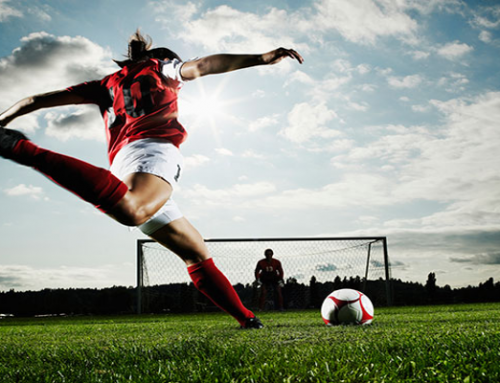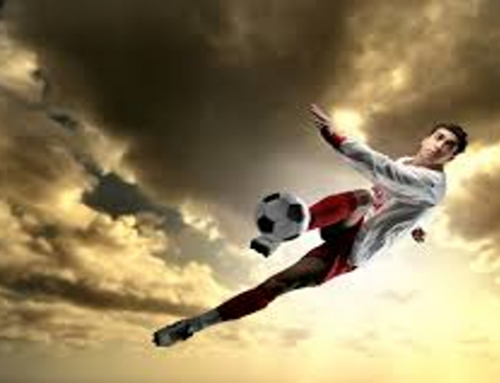It is impossible to be confident on match day if you have no self-belief.
It is possible to be confident on match day some of the time if you have some self-belief.
But if you ooze self-belief; if self-belief is flowing around your body and through every pore then you have a great chance of being confident far more often than not. And high self-belief delivers bullet proof confidence. Have a bad game and you won’t be as susceptible to a drop in confidence and a subsequent slump in form.
A big part of my job as a football psychologist is to help my clients build self-belief. All the best athletes on the planet have this quality. It astounds me that a footballer wouldn’t have a few simple football psychology techniques to help him build and maintain this most vital of human qualities.
Self-belief is to confidence what foundations are to a house or an engine is to a car. My job is to give you football psychology techniques to build a strong foundation, or if we’re comparing to a car, then a top class engine. In fact, let’s pimp this engine; let’s soup up your car by increasing the power of its engine.
Self-Belief: It Starts With Your Self-Image
Your self-image rules your football game.
Your self-image rules your football game.
What is your self-image? Your self-image is how you see yourself. Simple!
You don’t have one self-image, you have lots. This is because you play many roles in life. You have a self-image about you as a husband, a wife, a father, a brother or sister, and a worker. You have a self-image about everything.
For example, what is the self-image you have about yourself and:
- Mathematics
- Writing
- Talking in front of large groups
- Driving
Perhaps you see yourself as being rubbish at maths and numbers, but a competent writer. Perhaps you see yourself as a confident presenter but as someone who can be a little shy down the pub.
And of course you have a self-image of you as a footballer. This is your football image.
Have a think about that for a few seconds. You have a self-image of you as a footballer, a football image. In fact, start thinking about your football image (a central part of football psychology). And guess what. Not only will you have a football image you will also have lots of mini football images.
For example, if you’re a striker you might have football images relating to:
- Your ability to move
- Your ability to score
- Your ability to hold the ball up or make the ball stick
- Your ability to find space
- Your ability to hit the target or strike the ball cleanly
- Your ability to win headers
- Your ability to play under pressure
- Your ability to focus
As a football psychologist these are just a few of the mini football images I explore with footballers. So remember, as a footballer you will have a whole range of football images.
And as a footballer your goal is simple: to build and maintain positive football images related to your game.
And as a coach your goal is simple: to help your players build and maintain positive football images related to their game.
You Are Not Born With It
Interestingly, you are not born with your self-images. You develop them yourself. You develop them in 4 ways:
- By judging your own experiences (perception)
- By remembering your experiences (memory)
- By your thinking
- By your imagination
So maybe as a footballer you keep remembering the chance you missed to score last week (memory.) And that makes you assume that others think you’re no good as a striker (perception). And you reinforce this by thinking you’re no good as a striker (thinking). And you then spend time imagining missing in the next game (imagination)… This is football psychology in action folks!
Do this every single day and you are feeding a negative football image of you as a striker. Your striker image!
And are you going to be able to be confident on match day if you keep feeding these negative images to yourself? Are you going to be able to perform under pressure? Are you going to have great football psychology?
It’s not going to happen. You are going to be lacking in confidence. You are going to be slow to the ball rather than first to the ball. You are going to lack effective decision making. You are going to be unaware of the movement of your team mates and the opposition around you.
I’m sorry, but if you become a slave to this kind of thinking then you are going to let your team mates down.
You are going to let your team mates down.
Case Study: The Rise and Fall of Tiger’s Self-Image
Football psychology can learn from Tiger Woods. To me, Tiger Woods is an example of someone who had an extraordinarily strong self image for his sport (his golf image) and it took some extraordinary life events to change and damage his golf image. Tiger Woods is, to me, an example of a walking psychological phenomenon.
The training Tiger Woods received from his father growing up is awe inspiring. At the age of six Tiger fell asleep to the sound of simple positive messages. He heard a voice from under his pillow, where his father placed a tape every night with messages such as “You will move mountains,” and “you will be the best.” Did this make a huge difference to his career? Who knows! But it set him on a journey that for over a decade helped him become one of the most mentally tough sportsmen ever to grace the planet.
At the age of twelve Tiger Woods started to have regular visits to a clinical sport psychologist called Dr. Jay Brunza who helped him hone his visualisation and imagination. And finally throughout his teenage years Tiger was exposed to a concentration technique that helped build his phenomenal focus. Earl Woods played with Tiger virtually every day and from the age of thirteen Earl would regularly do small things that might put Tiger off. He would cough when he got to the top of his backswing or rattle his clubs when Tiger drew his putter back. As Earl recalled later before his death it would frustrate Tiger immensely but he knew it was an important exercise to help hone his focus ability before he entered the melee of professional golf.
And so Tiger Woods listened and learned and grew a strong golf image, perhaps stronger than there’s ever been in professional golf. He saw himself competing with and beating the best and when he got to the course I would take an educated guess that his mindset was “I’m Tiger, I’m here and I’m going to win. This is my course, this is my tournament and no one is going to beat me.” And win he did, until the events of December 2009 unfolded.
People can quibble that the current demise (at the time of writing this) of Tiger Woods is down to his poor physical shape or the swing changes he’s making. But for me the accusations and subsequent acceptance of marital misdemeanours has changed Tiger’s self image and specifically his golf image which have damaged his performances on the course. He may launch a come-back, you can’t rule him out. But he will never be the same Tiger Woods again. The same dominant, even mystical figure, ever again.
Keeping a Positive Football Image
A football image is like a bank account. The more money you put into a bank account the more interest you get. The more positive your thoughts the better your football image, the more confident you will be and the better you will play. Spend more than you make, then your bank account goes into the red and you will be charged by the bank. Think more negative thoughts than positive thoughts and you will have a poor football image; you will lose confidence and play worse.
You have to have more positive thoughts to feed your football image than negative thoughts to be the best you can be.
You cannot afford to compromise. You must keep a positive football image. And you must keep a positive image of all the game components that make up your football image….helping you have strong football psychology foundations.
Lionel Messi’s REAL Talent
As I write the best footballer in the world is Lionel Messi. He really is outstanding.
People see Lionel Messi play and watch his silky skills, his ability to go on long mazy runs, his incredible eye for goal.
And it’s fair to say that he has enormous technical ability. No one can dispute that. But there’s a famous advert that you can view on You Tube that highlights a talent Messi has that might be the talent that has more impact on his game than his physical skills…his football psychology. This is what Messi says on this advert:
“When I was 11 I had a growth hormone problem. But being smaller I was more agile. And I learnt to play with the ball on the ground because that’s where it felt more comfortable. Now I realise sometimes bad things can turn out good.”
Messi said this on the iconic Adidas “Impossible is Nothing” adverts and it gives us a great insight into his mindset.
There is no doubting his physical talent. He took to the pitch and was better than most in his age group as he developed at the Barcelona Academy. However, would he have been the footballer he is today without strong football psychology? Probably not! And the way he saw his battle against his growth hormone problem highlights an important quality that all champions have when it comes to dealing with tough times and tough challenges.
Champions find the positives in everything they do.
It’s a simple statement but very difficult to be able to achieve. Champions are brilliant at being able to see the solution in a problem. They are able to draw positives from a negative event.
Let’s break this down. Can you draw positives from:
- A defeat
- A personally poor game
- Criticism from a coach, manager or team mate
- A poor training session
- An injury
The fact is Lionel Messi’s biggest talent was to turn something that was a negative into something that worked for him and helped him become the best player in the world.
Lionel’s Messi’s biggest talent was Confident thinking.
Let’s think back to the areas that impact our self image:
- Perception
- Memory
- Thinking
- Imagination
Lionel Messi is brilliant at perceiving things in a positive way and then thinking confidently about the situation.
Messi refused to let his physical size handicap him. In fact he used it to his advantage. “I am more agile” he said. “I can learn to play with the ball on the ground better than everyone else” he said.
Can you start seeing everything in a positive light? Can you start seeing every situation as a challenge rather than a problem?
Can you start seeing everything in a positive light? Can you start seeing every situation as a challenge rather than a problem?
Think about some of the problems you face. Can you see these situations as challenges? Can you see them in a positive light?
I will give you some specific techniques to build your football image in part 2 of this chapter but right now let’s have a look at the making of another very accomplished modern player.
The Gary Neville Effect
The Lionel Messi story isn’t dissimilar to Gary Neville’s experience.
Gary Neville grew up playing at the Manchester United Academy amongst some of the best modern day footballers in England. He played alongside David Beckham, Paul Scholes and Ryan Giggs.
It’s fair to say he looked around and saw some seriously good talent. As a footballer of average physical gifts he could choose to either dwell on this as a negative or look on it as a positive situation. He chose the latter.
He chose to think about how lucky he was to be able to compete against some of the best young players on the planet. He chose to think about how good he could become if he worked harder than them. He chose to imagine the exciting future he would have if he used them to learn all he could about his role as a right back.
He chose to look at the situation in a positive light and it paid off. He didn’t moan and groan; he didn’t give up. He grew a strong football image because he used the challenging situation he had to drive him to be all he could be. And where did that get him? Playing for England…that’s where!
So how do we build our confident thinking?
I’m going to give you four seriously powerful football psychology techniques. These techniques are linked together, are related and can be used separately or combined. By using these football psychology techniques you can become a great thinker of your football.
You may think and feel that you’re a positive thinker and that you have a strong football image. Maybe you do. Maybe this section of the book is less important to you than the other sections. But stop and think for a few minutes.
I believe everyone can afford to think a little better every day, even positive thinkers. I think that you can afford to improve your football psychology by spending time becoming more aware of your thoughts, because if you can become an even more effective thinker, and if you can build an even stronger football image, then you will be the best footballer you can be.
Hey, you may even surprise yourself. You may discover you’re not quite as positive as you can be. You may discover a few new, simple football psychology techniques to improve your game.
If you can become an even more effective thinker, and if you can build an even stronger football image, then you will be the best footballer you can be.
So let me ask the questions:
- When you think about your football what do you tend to think about?
- When you think about your last match what is held in your mind?
- Do you think about your best moments or do you think about your mistakes?
- Do you think about the chances you made or the chances you missed?
- Do you think about the passes you completed or the passes you gave away?
- Do you think about the tackles you won or the tackles where your opponent out muscled you?
I ask these questions because I have quite a few people say to me “but I think about the bad stuff because I need to be realistic”.
The problem with this attitude is that you will constantly bombard your football image with the bad stuff. By being “realistic” and remembering the mistakes you made and the poor parts of your performance you have no chance of building your confidence. Of course there is a time to examine what needs to worked on in your game and football psychology technique four deals with getting the right balance between thinking about your strengths and your weaknesses. But right now let’s get on and teach you football psychology technique one…




